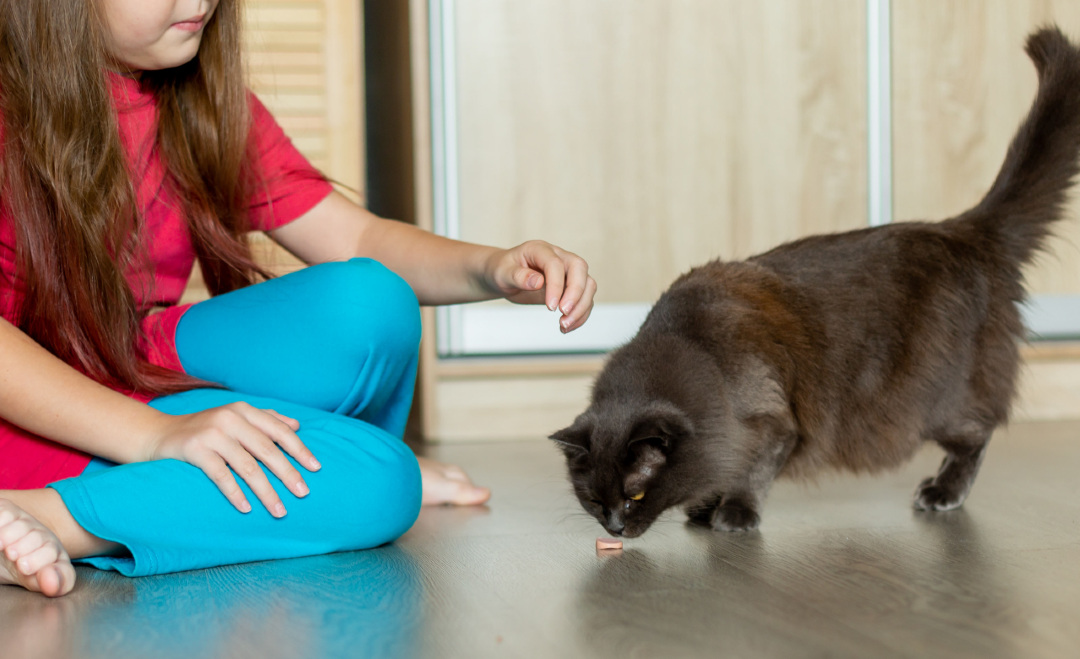You really love your cat, but your furry feline friend indeed has a wild, feisty personality. If you’re a cat parent, you need to know how to discipline your cat at an early age. While this may take some trial and error, it’s not impossible. Disciplining a cat is not quite like training a dog -every cat is different.
While one may react positively to a particular style of behavior correction, others may reject your efforts, and any attempt at correcting may have the opposite effect. The fact is, it’s hard to discipline a cat if you’ve never lived with one. To get started the right way, follow these 10 tips on how to discipline a cat at home.

How to Discipline a Cat
Once your cat starts to understand what behavior is appropriate and what’s not, there will be less need for improving those bad behaviors.
Cats and Dogs Are Different
Understanding that you have to approach your cat discipline process differently is the key to a long and fruitful relationship. If you have a trained dog at home, you may be tempted to use similar tactics that worked for your dog. Don’t do that. Cats and dogs have very different learning patterns. Dogs are more likely to engage in the training process by actually paying attention to your instructions, while cats won’t follow your commands to sit or stay.
No Hitting
Training your cat can be quite frustrating the first time around, but you should never resort to disciplining her physically. Physically disciplining a cat may break your connection to her. Never shake, hit, or hold down your cat. Hurting her will only make the situation worse and cause her to lash out.
Don’t Yell to Make Your Point
Unless you speak the same language as your cat, don’t be deceived into believing she’ll understand you better when you yell at her. While she may understand that the change in your voice means something has changed, yelling will only scare her away. Correcting by relying on yelling may cause your cat to feel anxious, which will inadvertently lead to additional misbehaviors.
Don’t Rub Your Cat’s Nose in Her Poop
The only thing you can hope to accomplish by rubbing your cat’s nose where she accidentally poops is agitating her. Remember, you don’t know her motives for not using the litter box. Rubbing her nose in an accident may have the opposite effect and give her the impression that it’s okay for her to go number 2 wherever she pleases. Your best bet is to simply clean the space and proceed to work on litter box training.
Don’t Spray Your Cat With Water
There is an old tale about spraying a cat with water to correct a cat’s bad behavior, but the truth is she likely won’t associate being sprayed with the misbehavior. She will probably stop doing what she is doing and run away from the spray, rather than understanding the method is linked to her bad behavior. Spraying your cat can cause her to become withdrawn at even the sight of a bottle, which is not the ultimate goal.
Don’t Allow Hurtful Play
All too often, pet parents let bad behaviors go unnoticed. You might think your sweet baby doesn’t know any better when she’s biting down on your hands during playtime. Allowing this behavior to go on will result in a grownup cat who thinks that biting and scratching is okay. With any new pet in the house, it’s up to you to set the tone early. If your cat scratches or bites during playtime, stop immediately so that she understands what is allowed and what is not.
Reinforce Good Behaviors
Unlike dogs, cats rarely learn from punishment, but by appreciating them and giving out tasty treats, you can train them to remember when they do something right. Remember to reward your cat during a deed of positive behavior to connect her good behavior and positive reinforcement.
Remove Your Attention When Your Cat Misbehaves
Cats love attention! That being said, withdrawing your attention from your cat when she misbehaves may be one of the most powerful techniques for making your point and halting bad behaviors such as pouncing, scratching, and chewing. Moreover, redirecting your cat’s attention to something else is an excellent way to prevent further bad behaviors. For instance, if your cat scratches on your bedsheets, redirect her attention to her favorite toy.
Consider Your Cat’s Health
While new kittens may take some time to learn where to relieve themselves, disciplined adult cats should have no issue finding the litter box. If you notice your cat suddenly urinating or defecating in other areas of the house, consider paying a visit to the vet. This sudden behavior change can indicate a shift in health, and your vet will be able to tell you if her health is the issue.
Changes to the Environment May Help
If you’re trying to stop your cat from tearing your couch apart or jumping on your counters, consider making some environmental changes around the house. For example, a small baking sheet set on the table’s edge will drop to the ground when she hits it. A silky blanket set on your couch will make her slide down whenever she tries to climb onto the seats. Do not make changes that could potentially harm your cat.
Takeaway
If you are a new cat parent, you probably have unrealistic expectations for your cat’s behavior. While some bad behaviors are common reactions to a cat’s surroundings, others may simply be bad habits needing correcting. Regardless of what bad or inappropriate behavior your cat is displaying, you probably want to put an end to it. Luckily, with the 10 tips above, disciplining your cat is a possible feat.
